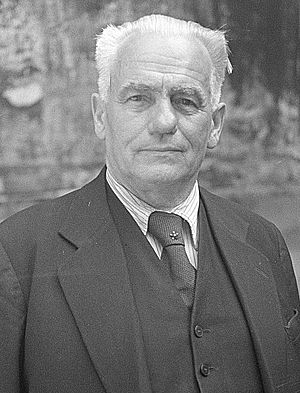Wilhelm Pieck facts for kids
Quick facts for kids
Wilhelm Pieck
|
|
|---|---|

Pieck c. 1946
|
|
| Chairman of the Socialist Unity Party of Germany | |
| In office 22 April 1946 – 25 July 1950 Serving with Otto Grotewohl
|
|
| Preceded by | None (office created) |
| Succeeded by | Walter Ulbricht (as First Secretary) |
| President of the German Democratic Republic | |
| In office 11 October 1949 – 7 September 1960 |
|
| Preceded by | Karl Dönitz (as President of the German Reich) |
| Succeeded by | Walter Ulbricht (as Chairman of the Council of State) |
| Personal details | |
| Born |
Friedrich Wilhelm Reinhold Pieck
3 January 1876 Guben, Brandenburg, Prussia, German Empire (now Gubin, Poland) |
| Died | 7 September 1960 (aged 84) East Berlin, East Germany |
| Political party | SED (1946–1960) |
| Other political affiliations |
|
| Spouse | Christine Häfker |
| Children | Elly Winter (1898–1987) Arthur Pieck (1899–1970) Eleonore Staimer (1906–1998) |
Friedrich Wilhelm Reinhold Pieck (born January 3, 1876 – died September 7, 1960) was an important German communist politician. He was the chairman of the Socialist Unity Party from 1946 to 1950. Later, he became the first president of the German Democratic Republic (East Germany) from 1949 until he passed away in 1960.
Contents
Early Life and Political Start
Wilhelm Pieck was born in 1876 in Guben, which was then part of the German Empire. Today, this area is in Poland. His father was a coachman, someone who drove horse-drawn carriages. After finishing elementary school, Wilhelm became a carpenter. In 1894, he joined a wood-workers' union. This led him to join the Social Democratic Party of Germany (SPD) the next year.
Pieck quickly became active in politics. By 1899, he was a local party leader. In 1906, he started working full-time for the SPD. During World War I, most of the SPD supported the German government. However, Pieck was part of a group that was against the war. Because of his strong views, he was arrested and held for a while. After being released, he lived in Amsterdam for a short time.
Joining the Communist Party
When Pieck returned to Berlin in 1918, he joined the new Communist Party of Germany (KPD). In January 1919, he was arrested with other important communist leaders, Rosa Luxemburg and Karl Liebknecht. Sadly, Luxemburg and Liebknecht were killed while being taken to prison. Pieck, however, managed to escape.
In 1922, Pieck helped create the International Red Aid. This group aimed to help political prisoners and their families. He later became its chairman in 1925.
Life During the Nazi Era
When the Nazi Party came to power in Germany in 1933, life became dangerous for communists. Pieck had to leave Germany quickly. He first went to Paris, then moved to Moscow, the capital of the Soviet Union.
In Moscow, Pieck continued his political work. From 1935 to 1943, he was a secretary for the Communist International. This was a worldwide organization of communist parties. In 1943, he also helped start the National Committee for a Free Germany. This group was created by the Soviets to unite Germans who were against the Nazis.
On June 22, 1941, Germany invaded the Soviet Union. Pieck and his family were in their country home near Moscow. He told his children that this invasion would be the end for Hitler. After the Soviet army won the Battle of Moscow in 1942, his family could return home.
After World War II
After World War II ended in 1945, Wilhelm Pieck returned to Germany with the Soviet army. A year later, he played a key role in combining the eastern branches of the KPD and SPD. This created a new party called the Socialist Unity Party of Germany (SED). Pieck became the co-chairman of this new party, sharing the leadership with Otto Grotewohl, who had been an SPD leader. Their handshake became a symbol for the new party.
Becoming President of East Germany
In October 1949, the Soviet-controlled part of Germany became a new country called the German Democratic Republic, or East Germany. Wilhelm Pieck was chosen as the first president of this new nation. He served as president until his death in 1960.
In 1950, Pieck lost his position as co-chairman of the ruling SED party. Walter Ulbricht became the party's first secretary. Even so, Pieck remained president because Joseph Stalin, the leader of the Soviet Union, trusted him.
Later Years and Family Life
Wilhelm Pieck was 73 years old when he became president. Although he held a very important position, he was not the main decision-maker in the party. That role was taken by Walter Ulbricht.
Pieck faced health challenges in his later years. He had a second stroke in 1953 and also suffered from liver problems. He passed away on September 7, 1960, in East Berlin.
Pieck was married to Christine Häfker, a clothing worker. They met in Bremen and married in 1898. Christine passed away in 1936. The Piecks had three children who also became involved in public life:
- Elly Winter (1898–1987) held various roles in the SED party and the East German government.
- Arthur Pieck (1899–1970) led the East German national airline, Interflug, from 1955 to 1965.
- Eleonore Staimer (1906–1998) worked as a party official and later as a diplomat.
Images for kids
-
Pieck (left) and Otto Grotewohl in 1949
-
1951 East German commemorative stamp of the Treaty of Zgorzelec establishing the Oder-Neisse line as a “border of peace”, with Pieck and President Bolesław Bierut of Poland
See also
 In Spanish: Wilhelm Pieck para niños
In Spanish: Wilhelm Pieck para niños
 | James B. Knighten |
 | Azellia White |
 | Willa Brown |






